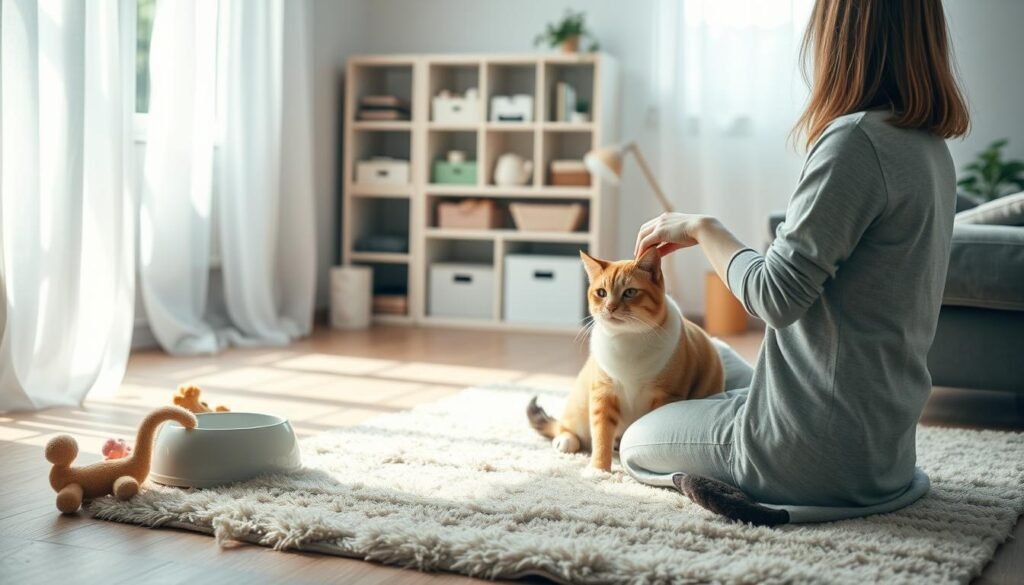Did you know that 79% of pet owners feel less stressed after being with their pets? This special bond is not just good for us—it’s also crucial for our pets’ mental health. Just like us, pets can feel happy, anxious, and lonely. Ignoring their emotional needs can cause bad behavior.
Good pet care means taking care of their mental health. This includes routines, socializing, and safe places. By doing this, we strengthen our bond with them and make them happier.
Key Takeaways
- Pets experience emotions like stress and joy, requiring intentional mental health support.
- A structured routine and social interaction reduce anxiety in pets.
- Neglecting emotional needs can cause behavioral problems, while proper care enhances trust and longevity.
- Assistance dogs help manage mental health challenges through trained support.
- Environments enriched with stimulation and comfort boost pets’ psychological resilience.
Understanding Your Pet’s Emotional Needs
Every pet has special emotional needs tied to pet health. Learning their behaviors helps strengthen your bond. Dogs, for instance, feel emotions like humans, says neuroscientists.
Their body language shows their feelings. This includes their tail and how they sound.
The Importance of Social Interaction
Socialization is key for a pet’s happiness. Over 70% of owners see their pets show joy, fear, or sadness. Dogs love activities like walks or playtime with their owners.
Dr. Ann Berger says, “Dogs know when someone is upset. They offer comfort.” This matches animal behavior training that focuses on positive actions.
Recognizing Signs of Stress in Pets
“Stress in pets often hides in small cues.”
- Excessive barking or meowing signals anxiety.
- Changes in eating or grooming habits may reflect emotional distress.
- Whale eyes (wide eyes showing white) or tucked tails point to fear.
Building a Routine for Emotional Stability
Pets like knowing what to expect. Regular feeding or playtimes lowers anxiety, just like for humans. Dogs with set routines have fewer problems.
Experts say daily routines help pets feel secure, which is vital for pet health management.
Creating a Safe and Comfortable Environment
Pet care begins with a safe home. A secure space lowers stress and boosts mental health. For dogs, 70% of owners see anxiety in stressful times. But, a calm area can help a lot.
A study shows pets with a safe space have 20% less anxiety.

Choosing the right spot depends on your pet’s needs. Cats like high places, while dogs need quiet spots. Crates must fit right to avoid bad behavior.
Keeping it comfy means controlling temperature and having secure fences. 65% of owners use bedding or blankets. This makes pets stay in their safe spots more.
Adding fun to their space is key. Try these ideas:
- Puzzle toys to keep boredom at bay (cutting destructive acts by 60%)
- Elevated feeders for big dogs to avoid bloat
- Outdoor areas for dogs or bird perches for birds
- Calming music like classical tunes, easing anxiety by 30%
Small changes can make a big difference. Adding a cozy bed or hiding spots is cheap but boosts mental health. 90% of vets say these steps are vital for your pet’s well-being. Every pet needs a place where they feel safe.
Nutrition and Its Impact on Mental Well-being
Feeding routines and dietary choices have a big impact on pets’ emotional states. A study showed that teens with diabetes who cared for fish twice daily saw better health management. This links regular feeding to routine-building benefits for both pets and owners. Proper pet nutrition is key for stable moods and less anxiety.
Start with a balanced diet rich in omega-3 fatty acids, B vitamins, and magnesium. Lack of these nutrients can cause aggression or hyperactivity. Choose whole foods over processed ones—like fresh proteins and veggies—to improve cognitive function. Many pet owners are now choosing healthier options: 60% of UK buyers prefer healthier pet foods.
- Omega-3 fatty acids support brain health and reduce stress
- Probiotics improve gut health, which influences mood through the gut-brain axis
- Tryptophan-rich foods increase serotonin production, easing anxiety
Feeding schedules are also important. Consistent mealtimes make pets feel secure. Over half of US consumers now prefer freshly prepared pet meals over standard brands. Younger owners (16–34) especially value quality over cost for frozen diets.
“Nutrition isn’t just about calories—it’s fuel for mental resilience,” says a 2023 veterinary study.
Look for brands with AAFCO certification and get vet advice to tailor meals. Diet can solve behavioral issues like pacing or aggression. Make sure your pet nutrition plan fits your pet’s age and breed needs.
The Benefits of Regular Exercise
“Pets help you be more active, get outside, and improve your mood, sleep, and mental health.” This holds true for pets too! Regular exercise isn’t just about physical fitness—it’s a mental lifeline for your furry friends.

How Exercise Affects Mental Health
Physical activity sparks positive changes in pets’ brains. It boosts endorphins, which reduce anxiety and stress. It also lowers cortisol levels, promoting calmness. For dogs, daily walks can prevent boredom-induced behaviors like barking or digging. Even short walks improve sleep quality, creating a healthier cycle for pets and owners alike.
Fun Activities to Keep Your Pet Active
Start with basics like dog walking—ideal for most breeds. Aim for 30-60 minutes daily, adjusting based on age and health. For example:
- Short bursts of play for puppies or brachycephalic breeds (like bulldogs) to avoid overexertion.
- Agility courses or fetch games for high-energy breeds like border collies.
Outdoor adventures aren’t the only option. Cats enjoy feather toys, while indoor dogs might love puzzle feeders. Always tailor activities to your pet’s needs.
| Pet Type | Exercise Ideas |
|---|---|
| Dogs | Walking, hiking, or swimming |
| Cats | Chase games or climbing towers |
| Rabbits | Enclosed outdoor runs or obstacle tunnels |
Consistency matters most. Even 20-minute daily walks beat sporadic long sessions. Exercise strengthens bonds and keeps both you and your pet happier and healthier!
Engaging Your Pet’s Mind
Mental stimulation is key to your pet’s happiness. Interactive toys and training sessions are like brain games. They keep pets sharp and calm. Puzzle toys, like treat-dispensing balls or hide-and-seek treats, challenge pets to solve problems.
Studies show dogs using these toys see a 30% drop in boredom-driven behaviors. Brands like Kong offer durable puzzles that engage pets for hours.
Children with ADHD showed improved focus when paired with therapy dogs during reading sessions. This bond highlights how animal interaction boosts both human and pet well-being.
Interactive Toys and Puzzle Games
- Treat puzzles encourage patience and problem-solving.
- Rotate toys weekly to avoid monotony—try DIY options like cardboard mazes or frozen treat cubes.
- Products like Nina Ottosson toys boost focus, with some improving problem-solving by 50%.
Training as a Form of Mental Stimulation
Animal behavior training is more than just tricks. Scent work, agility, or obedience classes engage multiple senses. Positive reinforcement methods build confidence while reducing anxiety.
For instance, clicker training teaches dogs to associate actions with rewards. This strengthens trust and focus.
Older pets benefit too—studies show mental exercises delay cognitive decline by keeping neural pathways active. Even basic commands like “sit” or “stay” become mental workouts when paired with gradual complexity. Always pair training with praise to reinforce joy in learning.
Understanding the Human-Animal Bond

The bond between humans and pets is more than just companionship. It’s a science-backed partnership. pet care that nurtures this bond boosts both your health and your pet’s well-being. The American Veterinary Medical Association calls this relationship “mutually beneficial and dynamic,” shaped by trust and care.
“Pets provide unconditional support, fostering emotional resilience in children and adults alike.”
Studies show 85% of pet owners feel less lonely with their companions. When you interact, like petting a dog for 10 minutes, stress hormones drop for both of you. Consistent affection builds security. Try these tips:
- Set aside daily playtime to strengthen trust.
- Use calming words during stressful moments to signal safety.
- Observe their body language to adjust your pet care approach.
Oxytocin, the “bonding hormone,” surges in both humans and dogs during mutual eye contact. This chemical link reduces anxiety and strengthens trust. Even physical touch matters: stroking a pet raises dopamine and serotonin, boosting happiness. For seniors, this bond fights loneliness and improves heart health.
Quality pet care means investing time to understand your pet’s needs. Their well-being mirrors your own—so nurture this unique relationship today.
Signs of Mental Health Issues in Pets
Good pet health starts with spotting early mental health signs. While 97% of U.S. pet owners treat their pets as family, only 36% can spot mental distress. Catching these signs early can prevent big problems and make life better for pets and their families.
“Pets with anxiety and fear do not live as long as pets without these conditions.”
Common Behavioral Problems
Look out for these warning signs:
- Excessive barking, hiding, or destructive chewing.
- Aggression toward family members or other pets.
- Compulsive behaviors like tail-chasing or over-grooming.
- Inappropriate elimination or loss of appetite.
When to Seek Professional Help
See a vet or certified behaviorist if your pet:
- Shows behaviors for more than 2 weeks.
- Acts aggressively or harms itself.
- Refuses to eat or sleep normally.
More than 70% of pets get better with vet-prescribed meds. Behavioral therapy helps 50% of pets. Getting professional help can help pets heal and strengthen the bond between humans and pets.
The Role of Routine in Your Pet’s Life

Consistency is key for pets. A set schedule lowers stress and builds trust. Pets do best when they know when to eat, walk, and play.
Studies show dogs with regular routines are 50% less likely to have behavior problems. Routines also help older pets avoid confusion. Puppies adjust 40% faster in homes with routines.
How Consistency Affects Mental Health
A routine helps pets feel secure. Unpredictable days can lead to anxiety, like cats grooming too much or dogs barking a lot. Structured feeding times can reduce destructive behavior by up to 30%.
The Wright Pet Daycamp uses set play and meal times to reduce stress in pets. Even small, consistent routines, like bedtime rituals, make pets feel safe.
Building Your Daily Schedule
Begin with the basics: feed at set times, walk dogs twice a day, and include play. For example, 7 AM walk, noon play, 5 PM feeding. Remember, flexibility is important too—70% of owners say adapting routines helps during changes.
In homes with multiple pets, stagger feeding times to prevent fights. Senior pets may need slower routines to avoid potty training setbacks.
“A routine isn’t a cage—it’s a safety net.”
Add training or grooming sessions weekly. Dogs in routine care do 25% better in potty training. Adjust routines based on your pet’s age and needs. Every step strengthens your bond and supports your pet’s care for life.
Alternative Therapies for Pet Mental Health
Therapies like aromatherapy and massage can help your pet’s mental health. They are gentle and work well when used right. Adding them to animal grooming routines can make a big difference.
The Benefits of Aromatherapy
Be careful when picking essential oils to avoid harm. Safe choices like lavender or chamomile can help with anxiety. Always mix oils right and talk to a vet first. Stay away from oils like tea tree, which are bad for pets. Here are some safe oils for pets:
- Lavender for calmness
- Chamomile for relaxation
- Frankincense for stress relief
Being around animals can lower stress and anxiety by reducing cortisol levels.
Exploring Pet Massage Techniques
Massage during animal grooming can help relax your pet and strengthen your bond. Techniques like light strokes (effleurage) for dogs or gentle pressure points for cats can improve circulation and comfort. Here are some methods to try:
| Technique | Benefit |
|---|---|
| Effleurage | Reduces muscle stiffness |
| Tapotement | Stimulates blood flow |
| Compression | Targets specific tension points |
Always get vet advice before starting therapies. Animal grooming routines are great for checking for stress signs like too much licking or fur loss. Make sure to keep your pet safe and get help from experts to fit therapies to their needs.
Socialization and Its Importance

Early exposure is key to building social skills. Puppies do best when they meet new people and sounds between 7 and 16 weeks. This is their prime socialization time. Kittens, on the other hand, are most curious between 4 to 16 weeks and benefit from interaction during this period. Even older pets can gain confidence through positive experiences.
Introducing Your Pet to New Experiences
Start with short, controlled interactions. For shy pets, begin with 5-minute sessions in calm places. Use treats and praise to reward calm behavior. Regular walks and visits to pet-friendly parks expose dogs to new sights and sounds.
Group Activities for Social Pets
Pet daycare offers safe spaces for dogs to play with others and staff. Structured playgroups can reduce anxiety by 30% in socialized dogs. Always check vaccination records before group events. Here’s a comparison of popular options:
| Activity | Benefits | Considerations |
|---|---|---|
| Pet daycare | Builds confidence through diverse interactions | Select facilities with safety reviews |
| Playdates | Encourages friendly behavior | Keep sessions under 30 minutes initially |
| Training classes | Strengthens bond with owners | Choose classes with positive reinforcement methods |
Adult pets can enjoy community events like dog-friendly festivals. Consistency is important. Even 15 minutes daily of social interaction can improve adaptability.
Recognizing and Addressing Anxiety
Keeping your pet healthy means managing their anxiety. Signs like pacing, hiding, or talking too much mean they need help. If you ignore these signs, your pet could face serious problems. So, it’s important to act quickly.
Common Triggers for Pet Anxiety
- Separation anxiety: Affects 15-30% of dogs, causing destructive behavior when owners leave.
- Noise sensitivity: 70% of pets react to loud sounds like fireworks.
- Changes in routine: Moving homes or new family members can overwhelm pets.
Strategies to Ease Anxiety
Behavioral training and changes in their environment can help a lot. For instance:
- Use calming aids like pheromone diffusers or anxiety wraps.
- Gradual exposure to triggers through desensitization helps pets adapt.
- Interactive play and regular exercise reduce stress hormones.
Early socialization cuts anxiety risks by 75% in dogs, per studies.
If your pet’s anxiety doesn’t go away, see a vet. They might need medicine or professional help. Taking small steps now can make a big difference in your pet’s life and your relationship with them.
The Importance of Veterinary Care

Regular vet visits are crucial for pets’ health. They help catch problems early, like thyroid issues or brain changes that affect behavior. For instance, regular vet visits can lower serious illness risks by up to 30%. This can help pets live 15-20% longer.
Regular Check-ups for Mental and Physical Health
Vet services include checking pets’ behavior during exams. Talk to your vet about your pet’s energy levels or if they seem anxious. Many clinics offer wellness plans that include exams, vaccines, and parasite checks at a lower cost.
Early detection through blood tests or imaging can prevent expensive treatments later.
Vaccines and Preventive Care
“Animals may carry germs, so vet-guided preventive measures are vital,” says Esposito.
- Rabies and parvo vaccines protect against deadly diseases.
- Heartworm prevention is 100% avoidable with vet-recommended meds.
- Year-round flea/tick treatments, like Frontline or NexGard, are advised.
Cost and Accessibility Tips
In India, basic check-ups start at INR 500. Telemedicine options also make care more accessible. Government schemes offer subsidized care in some areas. Ask vets about discounts for senior pets or plans for multiple pets.
Preventive care saves money and stress. Vaccines cost INR 1,000–3,000 yearly. But skipping them can risk life-threatening illnesses.
Building Resilience in Your Pet
Helping pets adjust to life’s changes is key. It involves teaching them to handle stress through routines, training, and positive interactions. Pets that are resilient bounce back quickly from vet visits or time in cat boarding facilities.
Consistent care helps them cope better. This ensures they stay calm during unpredictable moments.
Positive Reinforcement Techniques
Training with rewards boosts confidence. Dr. Patricia McConnell’s research shows that structured routines and activities like teaching tricks help dogs after stress. For example, creating a “safety spot” with blankets gives pets a secure place during changes.
Studies show that 11 million U.S. households found pets essential during the pandemic’s stress. Pets do well when owners balance affection with boundaries, avoiding too much attention.
Helping Your Pet Cope with Change
Preparation is crucial for transitions like cat boarding. Bring their bed or toys to new places. Dogs cope better when owners keep exercise and feeding schedules consistent during changes.
Introduce new situations slowly and praise them for calmness. Remember, resilient pets are nurtured through patience. Owners who practice self-care also model calmness, affecting pets. Small steps, like daily walks or puzzle toys, build mental strength.
FAQ
Why is mental health important for pets?
Mental health is key for pets just like it is for humans. Pets feel emotions, stress, and anxiety. Taking care of their mental health makes them happier and healthier.
How can I tell if my pet is stressed?
Look for signs like changes in eating, too much grooming, and loud noises. Also, watch for withdrawal and destructive acts. Knowing what’s normal helps spot stress.
What does a balanced diet for my pet include?
A good diet is right for their species and boosts brain health. Include omega fatty acids, probiotics, and tryptophan. These help with mood and thinking.
How much exercise do pets need for their mental well-being?
Exercise needs vary by pet type, age, and health. Regular walks or play reduces anxiety and keeps them happy.
What are some effective environmental enrichment ideas for my pet?
Try interactive toys, new places, and sensory areas. Cats like vertical spots, while dogs enjoy digging boxes.
How can I strengthen my bond with my pet?
Spend quality time with positive interactions and play. Pay attention to their signals. This strengthens your bond and boosts their mental health.
What should I do if my pet shows signs of anxiety?
Find out what causes their anxiety and manage it. Create a safe spot, use calming aids, and seek help if needed.
How frequently should I take my pet to the vet?
Regular vet visits check their physical and mental health. These visits catch problems early and help keep them well.
What are positive reinforcement techniques?
Positive reinforcement rewards good behavior. It builds confidence, improves learning, and helps with emotional control in pets.
Source Links
- Pets and mental health: do pets really boost your wellbeing? — Calm Blog – https://www.calm.com/blog/pets-and-mental-health
- Animals and your mental health – How they can support your wellbeing and recovery – https://www.rethink.org/advice-and-information/living-with-mental-illness/physical-health-and-wellbeing/animals-and-your-mental-health-how-they-can-support-your-wellbeing-and-recovery/
- Are We Meeting Dogs Emotional Needs? – https://www.dogdecoder.com/meeting-dogs-emotional-needs/
- Exploring the Unseen: A Deeper Dive into Your Pet’s Emotional Well-being – https://www.magnoliavets.com/blog/exploring-the-unseen-a-deeper-dive-into-your-pet-s-emotional-well-being
- The Emotional Well-being of Pets: How To Understand Your Dog’s Emotions | Pet Ponderosa – https://petponderosa.com/2023/10/the-emotional-well-being-of-pets-how-to-understand-your-dogs-emotions/
- Creating a Safe Place for Dogs: 7 Vet-Approved Tips – https://thevets.com/resources/pet-safety/safe-place-for-dogs/
- Creating a Pet-Friendly Home: Tips for a Safe and Happy Environment – https://www.healthy-pet.com/blogs/blog/creating-a-pet-friendly-home-tips-for-a-safe-and-happy-environment?srsltid=AfmBOorAl6hctY-f8iOz5tlhWDkGIskg-OsdUwKPRGQ8zYoTUEeqn7Cb
- Coastal Pet Products – https://www.coastalpet.com/blog/how-to-create-and-maintain-a-healthy-environment-and-lifestyle-for-your-pet/?srsltid=AfmBOoon0poxjQ5uE_LOm6fTRYBMHqkqAugzmX2gHwNCZebozaB96c1g
- The Link between Animal Nutrition and Behavior: How Diet Impacts Mental Health – https://www.hilarispublisher.com/open-access/the-link-between-animal-nutrition-and-behavior-how-diet-impacts-mental-health.pdf
- How Pets Impact Our Health & How We Impact Theirs | Mintel – https://www.mintel.com/insights/household/how-pets-impact-our-health-and-how-we-impact-theirs/
- The Physical and Mental Benefits of Exercise for Pets – https://thevets.com/resources/pet-health-care/physical-and-mental-benefits-of-exercise-for-pets/
- Healthy Exercise for Dogs | VCA Animal Hospitals – https://vcahospitals.com/know-your-pet/healthy-exercise-for-dogs
- The Power of Playtime: Keeping Your Pet’s Mind and Body Active – https://www.fetchpetcare.com/blog/the-power-of-playtime-keeping-your-pets-mind-and-body-active/
- Canine Enrichment – 5 Tips to Engage Your Dog’s Mind and Body – https://dogsinc.org/blog/ask-the-trainer/canine-enrichment/
- Healthy Minds, Happy Pets: The Benefits of Pet Enrichment – https://www.vhvet.com/services/other/blog/healthy-minds-happy-pets-benefits-pet-enrichment
- Understanding the Human-Animal Bond | Love Always Veterinary Blog — Love Always Veterinary Care – https://lovealwaysvet.com/blog/human-animal-bond
- Understanding the Human-Animal Bond – https://www.wisdompanel.com/en-us/blog/human-animal-bond
- Pet Mental Health: Recognizing Signs of Anxiety and Depression in Pets – https://www.ellisvillevet.com/services/blog/pet-mental-health-recognizing-signs-anxiety-and-depression-pets
- What You Should Know About Mental Illness in Pets – https://www.ovrs.com/blog/mental-illness-in-pets/
- Understanding Pet Mental Health: Recognizing and Managing Anxiety and Depression – https://brawleyanimal.com/recognizing-managing-pet-mental-health/
- The Importance of Routine in Your Pet’s Life – https://thewrightpet.com/the-importance-of-routine-in-your-pets-life/
- No title found – https://www.akc.org/expert-advice/health/why-your-dog-needs-routine/
- The Importance of Establishing a Routine for Your Cat or Dog – https://www.zoetispetcare.com/blog/article/importance-routine-cat-dog
- Understanding Holistic Veterinary Care and Natural Pet Health Solutions – https://www.geniusvets.com/pet-care/learn/dogs/dog-integrative-medicine/blog/understanding-holistic-veterinary-care-and
- Natural Pet Remedies That Humans Use, Too – https://www.webmd.com/pets/ss/slideshow-pets-natural-remedies
- The Role of Animal Assisted Therapy in the Rehabilitation of Mental Health Disorders: A Systematic Literature Review – https://www.integrmed.org/journal/view.php?number=55
- The Importance of Proper Pet Socialization – https://www.brownswitchpethospital.com/blog/the-importance-of-proper-pet-socialization/
- The Importance Of Pet Training And Socialization – https://www.truecareveterinaryhospital.com/blog/pet-training/
- 5 Reasons Why Pet Socialization is Critical | Longwood Veterinary Center – https://longwoodvetcenter.com/pet-socialization-raising-a-well-adjusted-dog/
- Understanding and Addressing Anxiety and Stress in Pets – Coal Creek Animal Hospital – https://www.coalcreekanimalhospital.com/blog/understanding-and-addressing-anxiety-and-stress-in-pets/
- Understanding and Addressing Anxiety in Dogs and Cats – https://thepetclinic.com/understanding-and-addressing-anxiety-in-dogs-and-cats/
- The Different Types of Veterinary Care Your Pets May Need | Animal Family Veterinary Care Center – https://animalfamilyveterinarycare.com/blog/the-different-types-of-veterinary-care-your-pets-may-need/
- The Importance of Regular Veterinary Care for Your Pet: Ensuring Health & Happiness – https://www.petkonnect.in/blogs/news/importance-regular-veterinary-care-pet?srsltid=AfmBOor00yT-MZyHx69PFXADlOnBrSOtga36BzYi1TsbqKQyAMTlZ9XT
- Why routine preventative care for your pet is essential – https://www.animalhumanesociety.org/resource/why-routine-preventative-care-your-pet-essential
- Building resilience in dogs: why it matters – PetProfessional – https://www.petprofessional.com.au/info-centre/building-resilience-dogs/
- How the Human-Animal Bond Increases Resilience and Empowers Us to Thrive | Mental Health America – https://mhanational.org/blog/how-the-human-animal-bond-increases-resilience-and-empowers-us-to-thrive/
- Resilience In Dogs: Expert Tips To Build It | Paws & Reward – https://pawsandreward.com/episode32/

